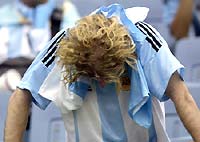Ken Ferris
The influx of overseas players into Europe's domestic leagues over the past four years means this World Cup is more European in style than any other with even Argentina adopting tactics familiar on the continent.
Pre-tournament favourites Argentina went out at the hands of Sweden after trying to play a European-style game of getting to the byline and crossing into the area, an approach that played into the hands of the physically strong Swedish defence.
 The flair of players like Diego Maradona, Osvaldo Ardiles and Mario Kempes was nowhere to be seen as under-performers like Juan Sebastian Veron and Gabriel Batistuta - who ply their trade in the English and Italian leagues - failed to ignite the team.
The flair of players like Diego Maradona, Osvaldo Ardiles and Mario Kempes was nowhere to be seen as under-performers like Juan Sebastian Veron and Gabriel Batistuta - who ply their trade in the English and Italian leagues - failed to ignite the team.
At previous finals Latin flair, African speed and surprise qualifiers with an unknown tactical approach -- from North Korea in 1966 to Cameroon in 1990 -- have lit up the tournament as the traditional powers have struggled to cope with a new dimension.
But the 2002 finals in South Korea and Japan - with the exception of the co-hosts - have thrown together so many teams who draw the bulk of their squads from teams in Europe that the surprise results are no longer so surprising.
Take Senegal, shock conquerors of France in the opening game of the tournament. All but two of their squad play their club football in France and the entire team fielded against their former colonial masters play in the French first division.
Senegal were almost more French than France -- coach Roger Lemerre described the match as one between Frenchmen who play abroad and Senegalese who play in France -- and that knowledge of the domestic game was clearly a factor in their win.
GROWING GULF
Ecuador coach Hernan Dario Gomez says his team's poor results and Argentina's shock defeat show there is a growing gulf between European and South American soccer.
"Potentially Europe is much more capable than South America and the best example of this is the loss of Argentina," Gomez told reporters.
Playing in their first finals, Ecuador lost both their opening matches against Italy and Mexico.
"Europe has stronger players than our countries. When you see Germany, when you look carefully they have players who are 20 years old as well as 27 years old, a mixture of youth and experience" added the Colombian.
"They have prepared not just for 2002 and 2006 but they are already prepared for 2010 and 2014. There is a long-term approach."
The problem for the Latin countries is that as soon as a player shows potential he is plucked out of the domestic game by the giants of European football and moulded to a European-style approach that can often squeeze out all the flair.
Argentina's exciting 20-year-old forward Javier Saviola, left out of the World Cup squad, says he was surprised by the physical nature of European football in his first season with Barcelona.
"I wouldn't have imagined just how much physical contact there is in the European game," said Saviola.
"I didn't think the style of play would be so defensive, either. I've always said I'll just try to adapt to things here, though, and that's what I'm going."
But in adapting to the European style that is a necessity in their club football players like Saviola lose the element of surprise that has always set the Latin American game apart.
ATTACKING STYLE
The exception at these finals are the co-hosts whose direct attacking style and quick feet have already caused problems for their Eastern European opponents, such as Poland and Russia.
Except for Seol Ki-hyeon at Anderlecht and Ahn Jung-hwan at Perugia, the entire South Korean squad plays at home or in Japan. The Japanese squad has a similar profile with only Hidetoshi Nakata at Parma, Shinji Ono at Feyenoord, Junichi Inamoto at Arsenal and Yoshikatsu Kawaguchi with Portsmouth playing abroad.
Japan's players have been encouraged to play in Europe for years with such advice coming from coaches like Arsene Wenger of Arsenal, who once coached here, and Japan's former national team manager Takeshi Okada, who led them at the 1998 World Cup.
But that element of surprise for their opponents could take them through the group stage and perhaps on to the quarter-finals as they are roared on by a raucous home support.
The winners of the tournament, however, are now likely to come from Europe unless Brazil, who are finally finding their form after a disappointing qualifying campaign, can turn on the samba magic and claim the trophy for a fifth time.

